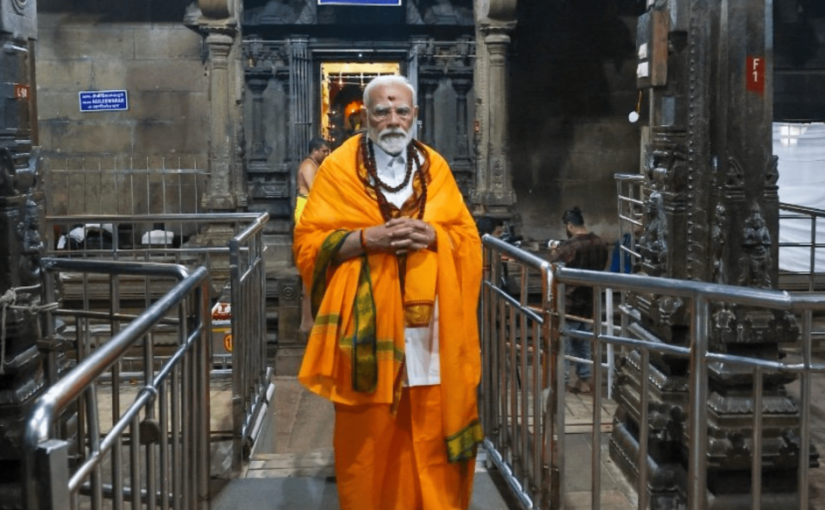This ‘god complex’ of Modi, expressed during a television interview on May 22, comes in tandem with what we have seen during the consecration of the Ram temple in Ayodhya this past January, where he became the head priest.
By Sangeeta Barooah Pisharoty
Soon after former prime minister Indira Gandhi aided the bifurcation of Pakistan into a new country – Bangladesh, a crown of divinity was famously placed upon her, particularly by the Hindu Right.
Gandhi was termed ‘Ma Durga’, the proverbial slayer of the demon, the Evil Mahishasura, for the Good to perpetuate.
In a democracy, with a secular constitution in place, a prime minister is, however, no god.
Gandhi too might not have had any delusions about her ‘divinity’. Anyway, history is proof that hours before her assassination in 1984, she had accentuated her role as a prime minister at a public rally – that of serving the people and the country, and if needed, with “every drop” of her blood.
That last speech Gandhi delivered in Bhubaneswar was in the run-up to the 1984 general elections where her party, the Congress, incidentally, went on to achieve what the Bharatiya Janata Party (BJP) under Prime Minister Narendra Modi is aiming for in these ongoing polls – ‘400 paar’, crossing the 400 mark in parliament.
Modi too, in his maiden Independence Day speech in 2014, defined his role as a prime minister of the world’s largest democracy – that of people’s primary servant, ‘Pradhan Sevak’. That day, he also rightly credited the constitution, and indirectly the Indian democracy, for having facilitated his rise to that position from a “poor small-town boy”.
In 2024 though, the same Modi, now seeking a return to the chair of the prime minister of the same country with the same constitution, for the third consecutive time, is terming himself no less than an incarnation of god. In his own words, he feels “god has sent me”. He might not have been born biologically, he says, because the “energy” that he feels within him can’t be from a biological body. It must have been bestowed upon him “by god”.
This ‘god complex’ of Modi, expressed during a television interview given on the sidelines of his campaign by the Ganga in Uttar Pradesh this May 22 comes in tandem with what we have seen during the consecration ceremony of the Ram temple in Ayodhya this January. The Prime Minister became the priest, the devotee of the ‘god’ that had “sent” him to earth; pushed to the sidelines the top religious leaders of the Hindu faith. As the veritable incarnation of ‘god’, he seemed enough to inaugurate the temple for the Lord that ‘historic’ winter day.
These utterances and actions will not have any shock value if you append to it the stories spun around his ‘extraordinary’ abilities even as a child since the time he rose to power. Remember the one about taming a crocodile with bare hands? That path of the extraordinariness of Little Modi carefully crafted for public consumption has, in less than a decade’s time, led to his ‘divinity’.
It may come across to some as delusional, even an expression of arrogance, or violation of the norms of the constitution which he once lauded for catapulting him to the position of the prime minister. Or better still, Modi may be simply prodding the votaries of the Hindu Right, for whom deifying a leader comes easy, to come out and vote for his party in large numbers. After all, he did say, “Those who will vote (for BJP) will get the punya (blessings) of good works I will do.”
In infamous company
What needs to be underlined here though is this – while Indira Gandhi didn’t call herself any incarnation of god, Modi nearly has.
And, significantly, by doing so, the Indian prime minister has entered an arena where an elected leader has rarely deified himself as no less than god or the one ‘sent’ by god.
An infamous example of such a leader that one can pull out of world history at once is that of Adolf Hitler. It is no secret that the image of Hitler was carefully crafted for the common Germans by the man himself, with the help of party loyalists, friendly media and publishers. Stories of Hitler’s childhood bravery were spun for circulation; laudatory biographies were rolled out, projecting him as Germany’s ‘saviour’.
The first major biography of Hitler which presented him as ‘Germany’s saviour’ also compared him to Jesus Christ, the god. That biography, Adolf Hitler: His Life and His Speeches, came out in 1923, and helped propel Hitler ‘up the political ranks’. It was published under the name of a German aristocrat and war hero, Victor von Koerber. The book had likened Hitler’s rise in the politics of Germany to Christ’s resurrection.
But what is much more noteworthy is this – a recent discovery about the authorship of that biography. To the shock of many, in 2016, Thomas Weber, a historian at the University of Aberdeen, had shown with strong evidence that the biography was ghostwritten by Hitler himself. The politician had, thus, projected himself as no less than god.
Weber had held up then, “The fact Hitler wrote the biography and collated the speeches himself and put it together under a different name speaks to the fact that at a much earlier time, he saw himself in this ‘saviour’ role and that he started in a very manipulative way to plot his way to the top.”
Indeed, that meticulously built image of a populist leader laid the bricks for Hitler to become the one to have led Germany to one of its darkest days. For many watchers of history, he would also be remembered as the only politician thus far to have also turned a democracy into a dictatorship by brandishing a Hindu holy symbol – the Swastika.
Courtesy: The Wire
